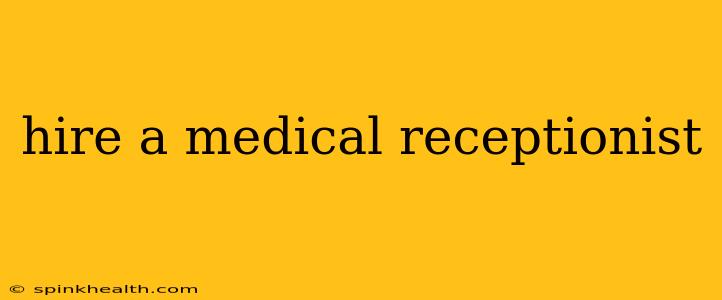The heart of any thriving medical practice beats with the rhythm of a well-organized front office. And at the center of that organization is the medical receptionist. Finding the right person for this crucial role isn't just about filling a position; it's about investing in the patient experience and the overall health of your practice. This guide will walk you through the process of hiring a medical receptionist, from crafting the perfect job description to navigating the interview process and beyond.
What are the Key Responsibilities of a Medical Receptionist?
This isn't just about answering phones and scheduling appointments. A medical receptionist is the first point of contact for patients, often setting the tone for their entire visit. Their responsibilities are multifaceted and often include:
- Scheduling appointments: Managing patient schedules efficiently, minimizing wait times, and accommodating urgent requests.
- Answering phones: Providing prompt and professional assistance to callers, routing calls appropriately, and taking accurate messages.
- Patient registration: Gathering and verifying patient information, ensuring accurate insurance details, and updating records.
- Handling insurance claims: Understanding insurance procedures, submitting claims, and following up on outstanding payments. This often requires familiarity with various insurance providers and billing systems.
- Maintaining patient records: Ensuring accurate and organized patient files, both physical and electronic. This involves adherence to HIPAA regulations and maintaining confidentiality.
- Handling correspondence: Managing incoming and outgoing mail, faxes, and emails.
- Front office organization: Keeping the reception area clean, organized, and welcoming.
What Skills and Qualities Should I Look For in a Medical Receptionist?
Beyond the technical skills, certain personality traits are essential for success in this role. Look for candidates who are:
- Excellent communicators: Able to interact professionally and empathetically with patients, colleagues, and insurance providers.
- Organized and detail-oriented: Able to manage multiple tasks simultaneously with accuracy and precision.
- Tech-savvy: Comfortable using computers, electronic health records (EHR) systems, and other relevant software.
- Problem-solvers: Able to handle unexpected situations calmly and efficiently.
- Team players: Willing to collaborate with other members of the medical team.
- Empathetic and compassionate: Understanding and responsive to the needs of patients, especially those who may be anxious or in distress.
How Do I Write a Compelling Job Description to Attract Top Candidates?
A clear and concise job description is critical for attracting qualified applicants. Highlight the key responsibilities, required skills, and company culture. Consider including:
- Job title: Medical Receptionist
- Company overview: A brief description of your practice and its mission.
- Responsibilities: A detailed list of the tasks and duties involved.
- Required skills and qualifications: Specify the necessary technical skills, experience, and certifications.
- Benefits and compensation: Clearly state the salary range, benefits package, and any other perks offered.
- Company culture: Give potential candidates a sense of your work environment and values.
What Interview Questions Should I Ask Potential Candidates?
The interview process should assess both hard skills and soft skills. Here are some questions to consider:
- Tell me about your experience in a medical office setting. (Focuses on experience and technical skills)
- How do you handle stressful situations? (Assesses problem-solving skills and composure)
- Describe your experience with patient interaction. (Evaluates communication skills and empathy)
- How do you prioritize tasks when faced with multiple deadlines? (Assesses organization and time management)
- How familiar are you with [specific EHR system used in your practice]? (Tests technical skills and knowledge)
- How do you maintain patient confidentiality? (Assesses understanding of HIPAA regulations)
What are the Legal Considerations When Hiring a Medical Receptionist?
Compliance with federal and state employment laws is crucial. Ensure you're familiar with regulations concerning:
- Equal Employment Opportunity (EEO): Avoid discrimination based on race, religion, gender, age, or other protected characteristics.
- Background checks: Conduct background checks as permitted by law.
- HIPAA compliance: Thoroughly train your receptionist on HIPAA regulations to ensure patient privacy.
How Can I Improve Employee Retention for My Medical Receptionist?
Investing in your employees is key to reducing turnover. Consider:
- Competitive compensation and benefits: Offer a salary and benefits package that's competitive with others in your area.
- Opportunities for professional development: Provide opportunities for training and advancement.
- Positive work environment: Create a supportive and collaborative work environment.
- Regular feedback and recognition: Provide regular feedback and acknowledge achievements.
Hiring the right medical receptionist is a significant investment. By following these steps and focusing on finding a candidate who possesses the necessary skills, experience, and personality, you can ensure your practice thrives. Remember, the first impression a patient has often starts with the receptionist, so choose wisely!

